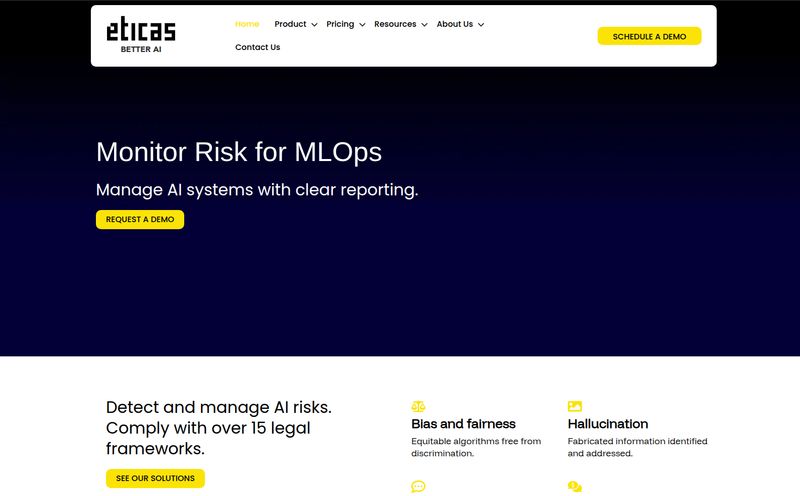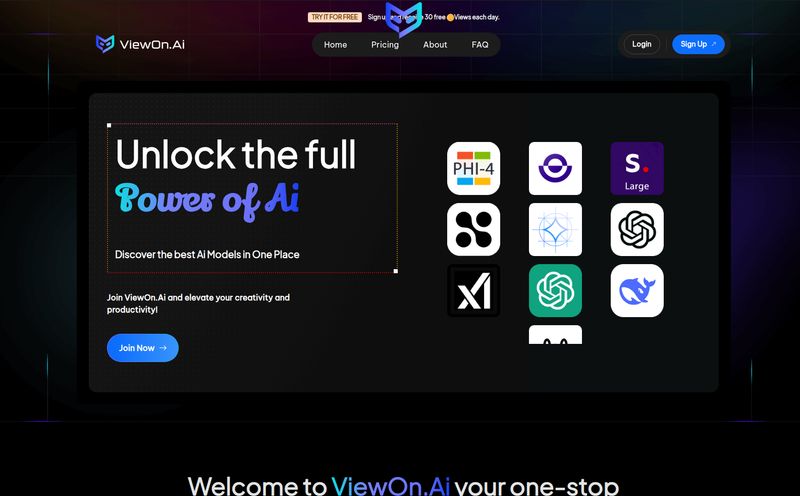If I have to identify one more bus, traffic light, or crosswalk to prove I'm a human, I might just short-circuit. CAPTCHAs. We all hate them. Those squiggly, impossible-to-read letters that make you question your own humanity. It’s the digital equivalent of being asked to pat your head and rub your stomach at the same time, just to log into your bank account.
For years, as an SEO and traffic guy, I've seen the data. High friction at login or checkout kills conversion rates. It’s a delicate dance that website owners have to perform, balancing robust security measures against the risk of frustrating a potential customer so much that they simply give up and go to a competitor. We lock the front door but we also want to welcome guests. It's a paradox.
But what if security could be… invisible? What if you could tell the good guys from the bad guys without making everyone fill out a Rorschach test? That's the promise of a tool I’ve been looking at recently called Roundtable. And I've got to say, I'm intrigued.
So, What Exactly is Roundtable?
In a nutshell, Roundtable is an AI-powered fraud prevention platform that works in the background to figure out if a user is a real person or a malicious bot. Their whole thing is "Proof of Human," and they do it not by asking you questions, but by watching how you behave.
Think of it like this: It’s less like a checkpoint guard demanding to see your papers and more like a seasoned detective who’s been observing the scene the whole time. The detective doesn't care what you say your name is; they notice the subtle tells—the way you hesitate before typing, the speed and rhythm of your mouse movements, the way you navigate from one field to another. A human has a certain cadence, a natural flow. A bot? Not so much. They're usually too fast, too perfect, or just... weird.
Roundtable builds this “identity layer” by analyzing session dynamics and cognitive patterns to separate the genuine users from the fakes, all in real time.

Visit Roundtable
The Magic Behind the Curtain: How Does It Actually Work?
This isn't just smoke and mirrors. The technology behind Roundtable is grounded in behavioral security, which is a fascinating field. It moves beyond outdated methods like IP blacklisting (which can easily block legitimate users on a VPN) and digs into the real-time actions of a session.
More Than Just Clicks: Continuous Behavioral Analysis
The system is constantly scoring sessions based on thousands of behavioral signals. We're talking about things like typing speed, mouse movements, click patterns, and interaction flows. It’s the digital body language of your users. A real person might pause to read a label or move their mouse erratically while thinking. A bot executing a script will fill out a form with inhuman speed and precision. Roundtable’s AI is trained to spot these differences, instantly flagging suspicious activity before it can do any damage, like an account takeover or a fraudulent transaction.
The Silent Guardian: An Invisible CAPTCHA
This is the part that gets me excited. The biggest win here is the potential to eliminate intrusive CAPTCHAs for the vast majority of your users. Roundtable operates silently in the background. If a user's behavior is perfectly normal, they'll never even know it's there. No popups, no puzzles, no friction. It's only when a session is flagged as high-risk that any kind of intervention might happen. This is huge for user experience. It means your real customers get a VIP lane straight through, while the bots get stopped at the velvet rope.
Privacy First, Always
Now, whenever I hear about tracking user behavior, my privacy alarm bells start ringing. And rightly so. But Roundtable seems to have built their platform with this in mind. They state that they are “privacy-preserving by design,” which means no personally identifiable information (PII) is collected and there's no cross-site tracking. This is a massive point for anyone concerned with GDPR, CCPA, and frankly, just being a good steward of user data. It's security that doesn't rely on being creepy.
Putting It to the Test: The Good, The Bad, and The AI
No tool is perfect, right? After digging through their materials and thinking about how this would play out in the wild, here’s my take.
What I Really Like About Roundtable
The real-time detection is obviously the headline feature. In a world of fast-moving automated attacks, you can't be working with yesterday's data. I also love the emphasis on “effortless integration.” I’ve been on projects where integrating a new security tool took a whole engineering sprint (or two). The promise of a simple deployment is music to my ears. Finally, the adaptive nature of the AI is a big plus. It's not a static set of rules; it learns and evolves as attacker methods change. That’s the only way to stay ahead.
A Few Things to Keep in Mind
Of course, there are considerations. Any powerful system like this will require some initial setup and configuration to tune it to your specific traffic patterns. It's not just plug-and-pray. Also, the spectre of false positives always looms with security tools. While their AI is designed to minimize this, no system can be 100% perfect. You might have a legitimate user with very unusual browsing habits who gets flagged. The key is how manageable and transparent those exceptions are. The “explainable results” feature they mention is meant to address this, which is a smart move.
Let's Talk Money: Roundtable Pricing
Alright, the all-important question: what’s it going to cost? I appreciate that they have straightforward pricing, at least for their entry-level plan. It's not hidden behind a “Contact Us for a Demo” wall, which always feels a bit like they're afraid to tell you teh price.
Here's the breakdown as I see it:
| Plan | Price | Best For |
|---|---|---|
| Starter | $99 / month | Startups and small businesses that need solid protection for up to 100k API calls/month. The 14-day free trial is a great way to test the waters. |
| Custom | Contact Sales | Larger businesses and enterprises with high traffic volume, or those needing specialized support and features like payments and transaction fraud detection. |
I did try to find their dedicated pricing page to link for you, and hilariously, got a 'Page Not Found' error. Maybe their own bot detection is a little too aggressive? Kidding, of course. But it’s a good reminder that on the web, stuff happens. All the more reason to keep the core user path clean and protected.
Who is This For? And Who Should Maybe Pass?
Based on its features, Roundtable is a fantastic fit for e-commerce sites fighting credential stuffing and carding attacks, SaaS platforms looking to prevent account takeovers and fake sign-ups, and financial services that need an extra layer of security without adding customer friction. If you have a login, a signup form, or a checkout process, you're a target. Period.
Who doesn't need this? If you're running a simple, static personal blog with no user accounts or forms, this is probably overkill. Stick with your basic anti-spam plugin and call it a day.
Frequently Asked Questions (That I'd Probably Ask)
Is Roundtable hard to integrate?
They claim “effortless integration.” From the looks of it, it seems to be a simple Javascript snippet or API integration, which is pretty standard for tools like this. It shouldn't require a massive engineering overhaul.
Does Roundtable comply with privacy laws like GDPR?
Yes, they specifically state their platform is “privacy-preserving by design” and doesn't collect PII or use cross-site trackers, which are key requirements for GDPR and CCPA compliance.
How is this different from Google's reCAPTCHA v3?
While both use a score-based system, Roundtable's focus is purely on a wider range of behavioral biometrics (mouse movement, typing cadence etc) to build a trust score, whereas reCAPTCHA often relies more heavily on a user's interaction history with Google's ecosystem. Roundtable's approach might be more privacy-centric for those wary of Big G's data collection.
Can it stop sophisticated human fraudsters?
Its primary strength is against automated bots. However, the “continuous behavioral AI” can also flag suspicious human patterns. A human fraudster working through a list of stolen credentials might still behave in an abnormal, hurried way that the AI could potentially identify as anomalous compared to a genuine user.
Will Roundtable slow down my website?
This is always a valid concern. Most modern security scripts like this are designed to be asynchronous and lightweight to have a minimal impact on page load times. The 14-day trial is the best way to test its performance on your own site.
What kind of data does it actually collect?
It collects behavioral metadata—how you interact with the page. This includes things like mouse movement coordinates and speed, keystroke dynamics (the timing between key presses, not the keys themselves), and general navigation flow. It does not collect the actual data you type into forms.
My Final Verdict on Roundtable
Look, the internet isn't getting any safer. The cat-and-mouse game between businesses and bots is a never-ending arms race. For a long time, the solution has been to put up bigger and more annoying walls, treating every user like a suspect until proven otherwise.
I think Roundtable, and behavioral security as a whole, flips that script. It’s a smarter, more elegant approach that assumes your users are legitimate and focuses its energy on identifying the true outliers. It shifts the burden of proof from the human to the bot. And for that reason alone, I think it's a technology worth paying close attention to.
If you're tired of fighting spam and watching users drop off because of clunky security, it might be time to stop asking them for proof of humanity and start letting their actions speak for themselves.



